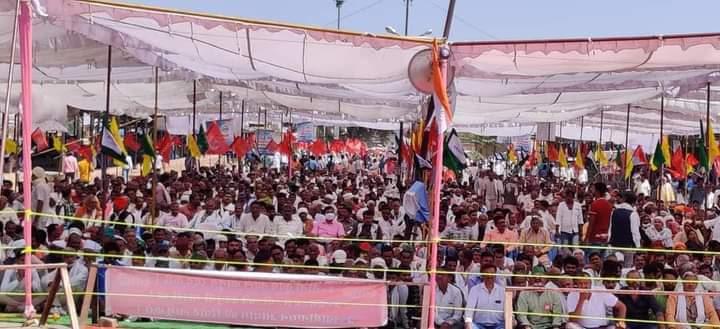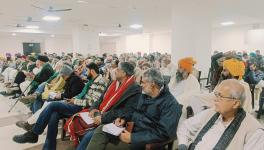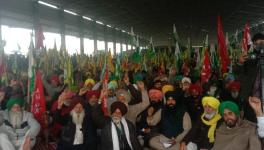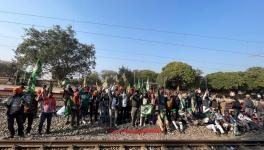Bharat Bandh Will Bring Together all Sections Against BJP's Corporate Communalism: Dhawale

Mahapanchayat in Sehora, Jabalpur on March 15
Ashok Dhawale, one of the prominent faces of farmers’ protest against three Central farm laws and laws for ensuring minimum support price (MSP) for crops says farmers have gauged the nerve of the nexus between government and big money that has been stoking corporate communalism and depriving millions of their due rights. However, the 10- month-long struggle has changed the status quo, making Bharatiya Janata Party (BJP) and its allies anxious about their political future. In a telephonic interview with NewsClick, Dhawale, President, of All India Kisan Sabha (AIKS), talks about the conditions of farmers in his home state, Maharashtra, how consistent struggles empowered them and preparations for the Bharat Bandh called by the Samyukta Kisan Morcha (SKM) on September 27. Edited excerpts:
Ravi Kaushal: For many people outside Maharashtra, the story of farmers revolves around farmer suicides. They are unaware of farmers' struggle for survival and miserable conditions in the state. Please tell us more about the conditions farming in the state and why the stories of misery do not end.
Ashok Dhawale: It is right that Maharashtra has been unfortunately in news for farmer suicides. The National Crime Records Bureau (NCRB) data suggests that four lakh farmers died by suicide between 1995 and 2020 across the country. Out of these, 75,000 were from Maharashtra, the biggest share of any state in the country. In Maharashtra, farmer suicides are mainly in the Vidarbha region, comprising Nagpur and Amaravati and other districts, and the Marathwada region.
The driving force behind suicides in these regions has been the cultivation of cotton. Its seeds are expensive and it is more prone to diseases. These regions have witnessed unexpected climate conditions. The last two years, we have been witnessing floods. Also, farmers do not get a fair price for their crops. On top of this, the insurance companies, which have been fleecing farmers with hefty premiums, outrightly deny compensation. AIKS gheraoed the agriculture commissioner’s office in Pune with other farmers’ organisations on August 30.
In Western and Northern Maharashtra, we have a sugarcane belt and like other states, the farmers have not been paid their dues. Their fair and remunerative price (FRP) is lower too as they get only Rs 280- 300/quintal, whereas farmers in Punjab are getting Rs 362/quintal.
We also have a significant population of tribal farmers who have been struggling for land pattas. After the Kisan Long March and our consistent intervention, thousands of farmers got pattas but we cannot say everyone got it. We are still struggling for it.
In recent times, Maharashtra is also witnessing a renewed crisis of milk farmers. The prices have crashed to Rs 20-22/litre, equivalent to the price of a mineral water bottle. After our struggle, the prices have started to rise. When we met the minister concerned, he acknowledged their plight and promised that he would put efforts into ensuring FRP for milk farmers too. I think it is for the first time that such a measure has been promised in any state.
The agricultural workers have their own issues in the state. They have been working under MNREGA (rural job guarantee scheme) but did not get their due payments. There is an army of unemployed people in the state who are asking for jobs but are not getting them because the government has been consistently cutting down allocation to the Central scheme. This is the overall picture of farmers and farming in the state.
RK: The recent findings of the 77th round of the National Sample Survey (NSS) paints a grim picture of farmers where their average income remains Rs 27/day. What does the survey say about Maharashtra farmers?
AD: The national survey gave us some surprising news. Apart from Rs 27/day income for farmers, it also noted that there has been an increase of 58% in farmers’ debt. Apart from the national average income, it came to our notice that there are 15 states where farmers are earning less than Rs 27/day and Maharashtra is one among them.
RK: With such a low income, the farmers can neither educate their children nor attend any medical emergency. How are they coping with the current distress?
AD: We organised a meeting of the All India Kisan Council in Wardha some years ago and decided to meet the families of farmers who died by suicide. The family members told us that they did not get loans from banks. In this scenario, they had to go to money lenders, who charge interest at 5%/month which means 60%/annum. In this precarious condition, if a natural disaster hits the crop, farmers face a double burden.
Prior to the advent of neo-liberalism, farmers were getting some loans but after 1991, the banks transferred this chunk of loans to big agribusiness. If some farmers did get loans, they were hounded by bank officials over non-payment, who would announce bankruptcy in the village through loudspeakers. This humiliation hit the self-respect of farmers and some of them died by suicide. Additionally, there is no remuneration and the input costs are going up. I am talking about the times when the prices of diesel and petrol were much below the Rs.100/litre benchmark. Just imagine how difficult is for farmers to do cultivation now!
RK: You have been arguing that lack of public investment has stopped the growth of agriculture. What’s your experience in Maharashtra?
AD: The question of public investment is important because only it can enable infrastructure growth in agriculture. If we take irrigation, for example, the expert committees suggested that the 45-50% area in the state can be irrigated if we do it proactively and scientifically.
Maharashtra has rocky areas and mountains too. But only 18% of the land is irrigated. When Maharashtra came into existence, only 6% area was irrigated. After 60 years of formation and pumping a huge sum of money, the irrigated area increased by only 12%. Of course, corruption is one of the factors. But, then there were certain schemes for employment generation which were helping farmers.
In 1972-73, Maharashtra witnessed its worst drought. After the drought, the Left parties struggled along with farmers’ organisations on the drought question. After our agitation, the government introduced two schemes. The employment guarantee scheme (EGS) was introduced after our struggle. It first came in Maharashtra. In later years, the National Rural Employment Guarantee Act (NREGA) was introduced.
EGS was the first scheme guaranteeing employment in the state. The second notable scheme was the Monopoly Cotton Procurement Scheme (MCPS) under which the state government procured cotton above the MSP with Rs 100 bonus. The farmers were assured about the payment. This scheme lasted till 1998.
The proponents of neo-liberal policies started attacking these schemes since 1991. So, both schemes were done away with. It is precisely in this period that we started seeing this horrific trend of farmer suicides.
Now, even, the Centre has done away with subsidies in fertilisers. In such a situation, when the Centre does not procure crops and the state government is abandoning its duty, the farmers had no way out.
RK: Several protesting farmers told us that free trade agreements have had an adverse impact on agriculture. Is that the case in Maharashtra, too?
AD: Definitely, there was an impact. The first victim of this free trade agreement regime was in form of crashing prices of milk powder. Coconut was another victim. Now, for the first time in the history of Independent India, the (Narendra) Modi government has reduced import duty on wheat to zero. When they are getting it cheaper, why would they pay higher MSP to our farmers?
This year, they increased the MSP of wheat from Rs 1,975/quintal to Rs 2,015/quintal. This is a nominal increase, and if we adjust it with inflation, it is indeed negative by 4%.
RK: While covering the protests, we found tremendous support for the movement in rural areas but the middle class is still distant from the farmers’ movement. How do you see this?
AD: It is true that the movement has less penetration in the middle classes but it is the upper-middle class that is not at all bothered about it. The lower middle classes are aware of the issues. They, too, are facing the brunt of unemployment and inflation.
Our experience from struggles liket he Kisan Long March suggests that they (middle class) will also join the protest. In Mumbai, hundreds of urban people flocked with slippers and sandals to Azad Maidan after they saw blisters on farmers’ feet. However, we will keep uniting the middle class through our intervention of trade unions, be it the organised or unorganised sector.
RK: The SKM has given a call for a third Bharat Bandh on September 27, during the course of 10 months-long protests. What are your preparations for it?
AD: We have been protesting at Delhi’s borders for 10 months now despite the government and its propaganda machinery trying everything to defame us.
First, we were branded as Khalistanis. Then we were called Maoists who are receiving support and funding from Pakistan and China. They tried to disrupt our tractor rally. We also witnessed the violence on January 26. They tried everything to break our unity, harass us, but we remained steadfast on our demands.
Why could they not break our unity? The answer lies in our diversity. There are Hindu, Muslim and Sikh farmers. They speak different languages.
This is the first time that farmers have identified corporate communalism and attacked it by naming the culprits as Modi- Shah, Adani- Ambani. They have figured out that what this nexus wants to achieve through rampant privatisation.
Through this Bharat Bandh, we want to unite all sections of society-- be it youth, women, dalit, tribal population, workers and farmers-- and say it loud and clear that we do not accept this agenda.
On August 26-27, we held a national convention of SKM at the Singhu border and deliberately put sessions on issues of different classes. The participants were proud that they would be participating in the Bandh wholeheartedly.
As far as preparations are concerned, we recently held a meeting in Mumbai where more than 100 organisations and political parties pledged their support to the bandh. The organisations have charted out their own programmes to mobilise people on the day.
Get the latest reports & analysis with people's perspective on Protests, movements & deep analytical videos, discussions of the current affairs in your Telegram app. Subscribe to NewsClick's Telegram channel & get Real-Time updates on stories, as they get published on our website.
























